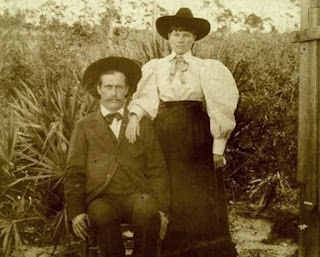 |
| The Wilders in Florida. Laura doesn't seem happy to be here. Not sure of the original source of this photo or who gets credit. I found it on Pinterest. |
I was so surprised when I read that fact in the book Pioneer Girl Perspectives: Exploring Laura Ingalls Wilder, Nancy Tystad Koupal, editor (South Dakota Historical Society Press, 2017). Laura's short Florida stay is mentioned in passing, but I halted in mid-sentence and set out to learn more.
Laura and her husband, Almanzo Wilder, and their daughter, Rose, spent most of 1891 and 1892 in the small, northern Florida town of Westville, which is tiny even now. The population today is less than 300. But Westville proclaims its sliver of Wilder history, I'm glad to say. So do other people. A Google search turns up all kinds of information.
There's a Laura Ingalls Wilder Homestead Park you can visit on County Road 163 in Westville. A historical marker stands at the site of the Wilder homestead and provides a brief history of Laura's time in Florida. Never have I been so anxious to read a sign. A little disappointed, maybe, to learn from it that the Wilders returned to the Dakota plains because Florida was too humid for Laura.
The sign also says Rose, as an adult, wrote a fictionalized account of the Florida sojourn and that the story won an O. Henry prize in 1922. Can't wait to read the piece, which is titled "Innocence."
The Wilders made the odd detour to Florida because family was already living here. A 2012 article in the Chipley, Florida, newspaper about Laura says relatives still live in the area.
The article also includes an interesting comment from Laura about her stay in Florida. It makes me think more than the humidity affected her perspective of her new home:
"... we went to live in the piney woods of Florida, where the trees always murmur, where the butterflies are enormous, where plants that eat insects grow in moist places, where alligators inhabit the slowly moving waters of the rivers. But at the time and at that place a Yankee woman was more of a curiosity than these...”She wasn't really a Yankee, of course, at least not in the sense that I think of Yankees (being one myself). But Westville is in Holmes County in the farthest reaches of northern Florida. It's practically a part of Alabama. In the early 1890s, some locals indeed might have been openly curious - and possibly resentful - about a Midwestern/Yankee woman trying to put down roots in the rural Old South.
The Laura Ingalls Wilder Historic Home and Museum in Missouri offers a booklet about the family's Westville period. I've put it on my to-be-read list. I'm curious about what Laura writes about life on the Florida frontier.
One of the main reasons I like Laura's autobiography and novels about growing up on the American frontier is her attention to the details of daily living. To think she turned that lens of observation on pioneer Florida is a treasure, indeed.
Postscript, 2018: I found and read the short story, "Innocence," through the Internet Archive digital library (https://archive.org). My take is that the locals were suspicious and possibly unfriendly to Laura during her stay in Florida. The cultural gaps had to be enormous. Also, the short story has a sinister plot twist that I hope was fictional and not based on a true incident.
Postscript, 2020: I bought and read the booklet about Westville and the effort to uncover history about the family's time in frontier Florida. Here's a link to my post about it.


